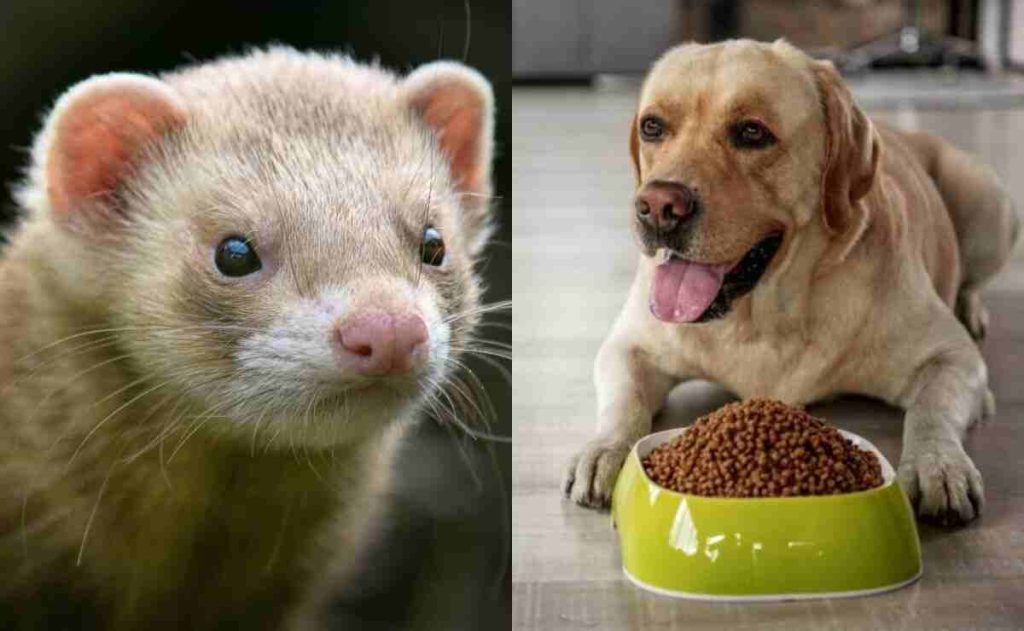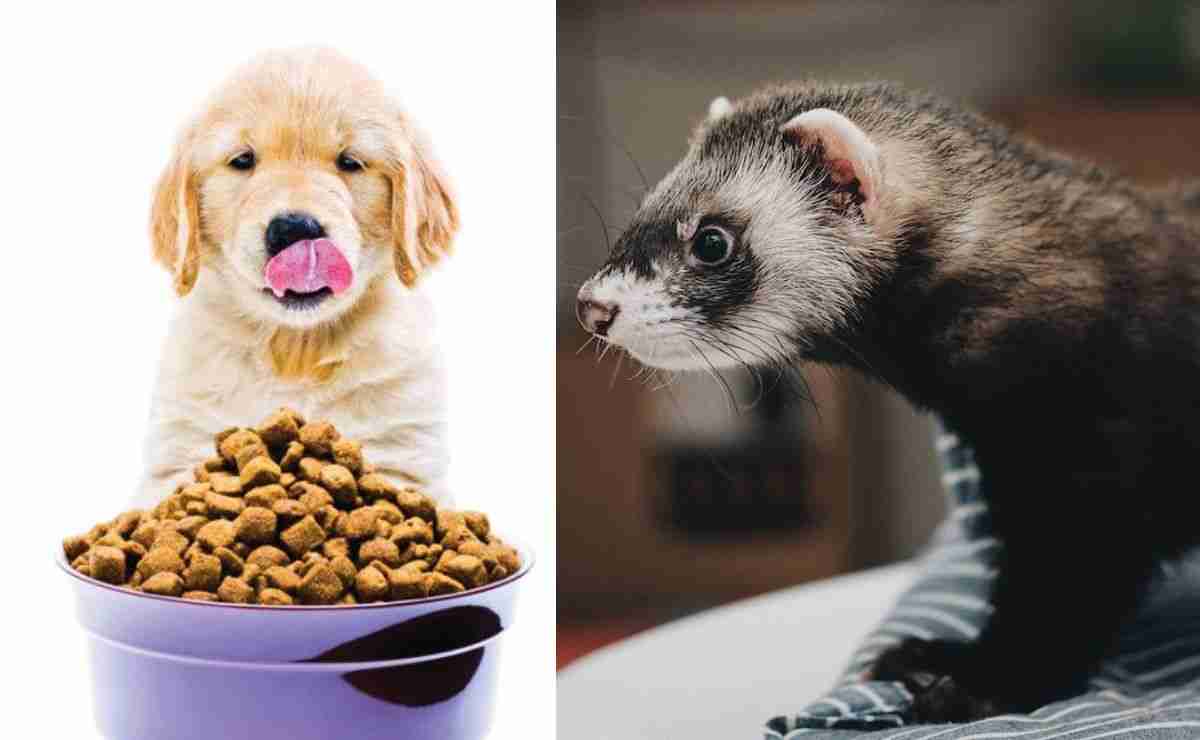Ferrets are known to have delicate digestive systems that require a specific diet. As a ferret owner, you may be curious about what foods are safe for your pet to consume. One question that often comes up is “can ferrets eat dog food”.
While it may seem like an easy solution to grab some kibble from your dog’s bowl, it’s important to understand the nutritional needs of ferrets and how they differ from dogs. In this article, we’ll explore the topic of feeding ferrets dog food and provide you with the information you need to make informed decisions about your pet’s diet.
Can Ferrets Eat Dog Food?

No, ferrets cannot eat dog food. Dog food is not nutritionally balanced for ferrets, and it does not contain the right amount of protein and fat that they need to stay healthy.
Besides, many dog foods contain ingredients like grains and corn that are difficult for ferrets to digest. Eating these types of foods can lead to digestive issues and other health problems in ferrets. It’s best to stick with a diet specifically designed for ferrets to ensure they get all the nutrients they need.
What is Dog Food?
Dog food is a type of pet food specifically designed for consumption by dogs. It is usually formulated to meet the nutritional needs of domesticated canines and may include ingredients such as meat, grains, vegetables, fruits, and other animal by-products. Commercial dog food is often sold in dry form (kibble), semi-moist form, or wet canned form.
When selecting a portion of dog food, it’s important to consider your pet’s individual needs. Factors such as age, size, activity level, and health should be taken into account when selecting a diet for a pup.
Overall, dog food is an important part of keeping your pup healthy and happy. By providing them with a balanced diet tailored to their individual needs, you can ensure they get the nutrition they need to live a long and active life.
Why Dog Food is Not Suitable for Ferrets?
Dog food is not suitable for ferrets because their nutritional needs are very different. Ferrets require a high-protein, low-carbohydrate diet that is rich in animal fats and oils. The protein content of dog food is typically too low to meet the nutritional requirements of ferrets.
Additionally, the carbohydrate content of dog food can be harmful to ferrets, as they have difficulty digesting carbohydrates and can develop health problems if they consume too much.
Ferrets also need more taurine than dogs do, which is an amino acid found in meat that helps regulate heart and eye function. Most dog foods contain only small amounts of taurine, so it’s important to feed your ferret a diet specifically designed for them. Commercial ferret diets are formulated with higher levels of taurine and other essential nutrients to meet the unique needs of these animals.
Also Read : Are Cat Foods good for Ferrets
What Happens When A Ferret Eats Dog Food Accidentally?
If your ferret eats dog food, it is important to monitor their health and behavior closely. While some ferrets can tolerate small amounts of dog food, ferrets are not designed to digest it. Dog food typically contains too much protein and fat for a ferret’s digestive system, which can cause digestive issues in Ferret such as vomiting or diarrhea. So, the lack of essential nutrients in dog food can lead to long-term health problems.
If your ferret has eaten dog food, you should switch them back to their regular diet as soon as possible. If you notice any changes in their behavior or physical health, consult a veterinarian right away. Also, make sure that your ferret has access to plenty of fresh water and that they are getting enough exercise and enrichment activities.
It is best to avoid feeding your ferret dog food if at all possible. If your ferret does accidentally eat some dog food, monitor them closely and consult a vet if needed.
What is The Natural Diet for Ferrets?
Ferrets are carnivorous animals, so their natural diet consists primarily of meat. In the wild, ferrets would eat small mammals such as mice and voles, as well as insects and bird eggs. Domestic ferrets should be fed a diet that is high in animal proteins and low in carbohydrates to mimic their natural diet. This can be achieved through a combination of commercial ferret food and fresh meat.
In addition to providing a balanced diet, it’s important to provide your ferret with plenty of fresh water at all times. It’s also recommended that you offer your pet small portions of food multiple times a day rather than one large meal. This will ensure they get the nutrients they need while avoiding overeating.
Finally, make sure to supplement your ferret’s diet with vitamins and minerals to keep them healthy and happy.
Can Ferrets Eat Pellets?
Yes, ferrets can eat pellets as part of a balanced diet. Pellets are a great source of protein and other essential nutrients for ferrets, such as taurine and omega-3 fatty acids. However, it is important to choose a high-quality pellet specifically designed for ferrets. These will contain the necessary vitamins and minerals that ferrets need to stay healthy.
Besides pellets, it is important for ferrets to have access to fresh food sources, like lean meats and eggs. Ferrets should also be given treats occasionally, but these should not make up more than 10% of their total diet. High-protein treats like cooked chicken or raw eggs are best.
Pellets can be an important part of a balanced diet for ferrets if they are fed in moderation and combined with other fresh food sources.
Conclusion
In conclusion, while ferrets may be able to eat dog food in small quantities, it is not recommended as a long-term diet option. Ferrets have specific nutritional requirements that are different from dogs and feeding them dog food exclusively can lead to health issues such as obesity and malnutrition.
It’s important to feed your ferret a balanced diet that consists of high-quality protein sources, fats, and carbohydrates. If you have any doubts about what to feed your ferret, consult with a veterinarian who specializes in exotic pets for proper advice. Remember, providing proper nutrition is crucial for the overall well-being and longevity of your furry friend.
